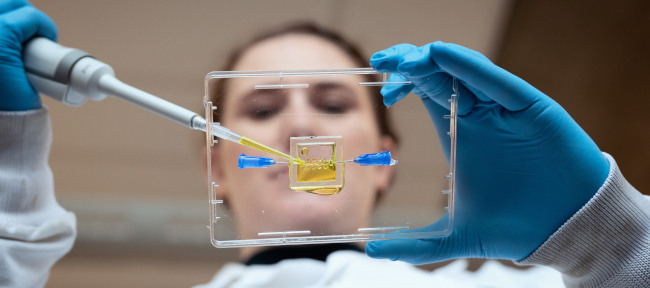
Novel spinal cord injury treatment project spearheaded by UBC researchers
By DE Staff
General Materials MedicalMultidisciplinary team’s project to employ bio-gel to bridge neural damage and encourage nerve regrowth.

(Photo credit: UBC/Mend the Gap)
Often leaving patients significantly impaired or paralyzed, SCIs don’t readily heal on their own. Following a severe injury, the edges of damaged neural tissue form a scar that restricts nerve growth. In addition, the edges of the legion are often separated by a fluid filled gap that can be centimeters-long. Having to span that gap makes healing all the more difficult since neural tissue has a limited ability to regrow.
According to the UBC researchers, current methods for repairing the damage typically involve invasive surgery to physically bridge that gap but produce limited results or can cause additional trauma.
In contrast, the method proposed by the UBC-led group, called Mend the Gap, looks to employ a machine-vision-guided surgical robot to inject a gel-like biomaterial into the damaged spinal cord to fill and mold to the cavity.
In addition to medications to counter the growth-inhibiting scar tissue, the bio-gel will also contain tiny magnetic rods that can be aligned across the gap, post-injection. The aligned rods then will act as scaffolding to encourage nerve regrowth in the correct direction across the cavity between lesion edges.
According co-principal investigator, Dr. Wolfram Tetzlaff, a professor of surgery and zoology at UBC and director of ICORD, the project’s goal is to increase motor function and improve quality of life for those with SCI.
In addition to Dr. Tetzlaff, the 32-member project includes researchers, engineers and surgeons from Canada, the United States, Europe and Australia. In Canada, the network includes UBC, ICORD, the University of Alberta, Western University, McGill University and University of Toronto.
https://mendthegap.ubc.ca
